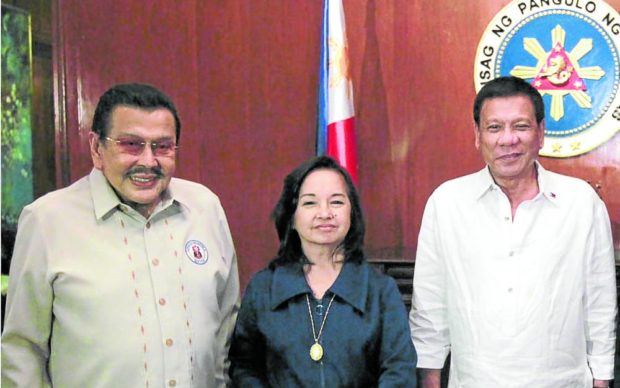Duterte allies in Senate seek more perks for ex-presidents

TOP LEADERS | Former Presidents (from left) Joseph Estrada, Gloria Macapagal Arroyo and Rodrigo Duterte stand to benefit from a proposed measure seeking additional perks for the country’s former leaders. This photo was taken in Malacañang in July 2016 during a National Security Council meeting. (MALACAÑANG FILE PHOTO)
MANILA, Philippines — Giving more benefits to former presidents, such as augmenting their security detail, will not affect state coffers, Sen. Ronald dela Rosa said on Monday as he defended a proposal that he and three other allies of former President Rodrigo Duterte had filed.
Senate Bill (SB) No. 1784, or the proposed Former Presidents Benefits Act of 2023, seeks to “maintain the dignity of the Office of the President and honor former Presidents of the Republic,” according to its authors.
It was filed on Jan. 26 by Dela Rosa and his colleagues Christopher “Bong” Go, Mark Villar, and Francis Tolentino.
Villar and Tolentino had served the Duterte administration as public works secretary and presidential political adviser, respectively, while Go remains a trusted aide of Duterte even as a senator.
‘Many social engagements’
Dela Rosa headed the Philippine National Police from 2016 to 2018, implementing the bloody drug war at the outset of Duterte’s presidency.
Article continues after this advertisementDela Rosa said the bill was Go’s idea.
Article continues after this advertisement“Go noticed the pitiful [situation of] the ex-presidents,” he said. “While they are already retired as presidents, many are still requesting… their appearances in [social] affairs. But they have no staff to write their speech or even prepare their schedule.”
“Take, for example, the case of [Duterte]. He’s no longer president, but he has many social engagements and responsibilities. Nobody is taking care of his schedule and speech,” Dela Rosa continued.
But Duterte is known for ditching prepared speeches and delivering impromptu remarks, usually laden with foul language.
According to Go, former presidents still meet with foreign dignitaries and local leaders, and this requires them to “employ the services of personal staff and maintain private offices.”
“While their terms [of office] have already ended, it did not mean that their services and sacrifices for the country have also ended. They still continue to help the people, that’s why the threats on their lives are also still there,” the senator said in a statement.
But only three months after the end of his presidency, the controversial leader — who faces a drug war investigation by the International Criminal Court — had become “really bored” with his life as a private citizen, as Go put it in an interview in September.
Under Go’s joint measure with Dela Rosa and other Duterte allies, former presidents would be provided with additional bodyguards to augment the security detail from the Presidential Security Group (PSG).
“They will also be given staffers for life as long as they need them,” Dela Rosa said.
Sen. Robinhood Padilla, another ally of Duterte, expressed support for the measure.
Besides Duterte, other living former presidents are Gloria Macapagal Arroyo and Joseph Estrada, the predecessor whom she ousted amid the events of People Power II (Edsa Dos) in 2001.
Turning around from that episode, Arroyo pardoned Estrada from his plunder conviction in 2007, while her own plunder case was dismissed by the Supreme Court in 2016, a month into Duterte’s presidency.
Arroyo is the incumbent representative of Pampanga’s second congressional district and a deputy speaker of the House of Representatives, while Estrada has retired from politics after his failed reelection bid in Manila’s 2019 mayoral race.
Privileges
Apart from SB 1784, there are a number of laws and orders passed for the benefit of former presidents.
Republic Act (RA) No. 5059, which took effect in 1967 without the approval of then President Ferdinand Marcos Sr., mandates that former presidents enjoy a few privileges after the end of their terms, such as a tax-free annual pension of P40,000 and free postage for all their correspondence.
The pension was increased to P96,000 (payable at P8,000 a month) when then President Corazon Aquino issued Executive Order No. 145 in 1987, amending RA 5059.
Another lifetime privilege is an officer-led security detail for each former president as provided by the PSG.
Diplomatic passports are also provided to former presidents through RA 8239 or the Philippine Passport Act of 1996. When traveling abroad, they are met by Philippine Embassy officials in the country they are visiting and are accorded certain courtesies by the host country.